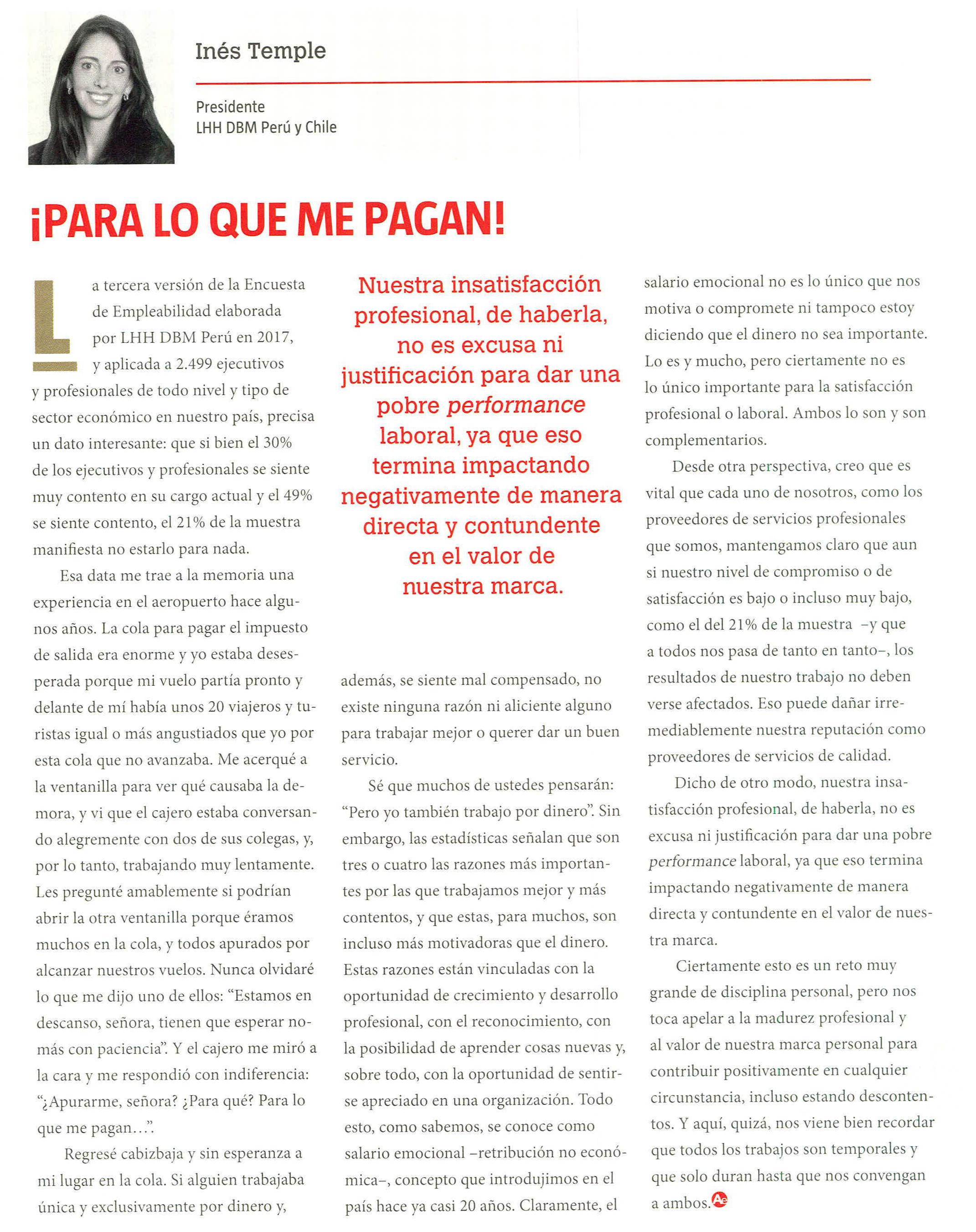Original Spanish version published in America Economia (Latam) on June 22, 2018
The third Employability Survey prepared by LHH DBM Peru in 2017, taken by some 2,499 executives and professionals of all levels and types of economic sectors in Peru, provides an interesting fact: that although 30% of these executives and professionals feel very happy in their current job and 49% feel happy, 21% responded that they were not at all happy there.
This data brings to mind an experience I had at the airport some years ago. The lineup to pay the exit tax was huge and I was desperate because my flight was about to leave and there were about 20 travelers and tourists in front of me, all equally or more distressed than I by this lineup that did not move. I went to the window to see what was causing the delay, and I saw that the cashier was chatting happily with two of his colleagues, and, therefore, working very slowly.
I asked them politely if they could open the other window because there were a lot of us in the lineup, and we were all in a hurry to reach our flights. I will never forget what one of them told me: “We are at on our break, madam. You just have to be patient”. And the cashier looked right at me and replied with indifference: “Hurry, ma’am? What for? Considering what they pay me…”
Crestfallen and without hope, I returned to my place in the lineup. If someone works solely for the money and, in addition, feels badly paid, there is no reason or incentive whatsoever to work better or to provide good service.
I know that many of you will think: “But I work for money too.” All the same, statistics show that there are three or four reasons why we work better and happier, and that these, for many, are even more motivating than money. These reasons are linked to opportunities for growth and professional development, with recognition, with the possibility of learning new things, and, above all, with the opportunity to feel appreciated in an organization. As we know, all of this is known as emotional salary —non-economic remuneration— a concept that we introduced in Peru almost 20 years ago. Clearly, emotional salary is not the only thing that motivates us or gets us to commit; nor am I saying that money is not important. It is and very much so, but it is certainly not the only significant factor for professional or job satisfaction. Both are important and complementary.
Seen from another perspective, I think it is vital that as providers of professional services, we keep in mind that even if our level of commitment or satisfaction is low or even very low, like the 21% in the sample —and this happens to all of us from time to time—, the results of our work should not be affected. This can irreparably damage our reputation as quality service providers.
In other words, our professional dissatisfaction, if any, is not an excuse or justification for poor work performance, since that ends up having a direct and decisive negative impact on the value of our brand.
Of course, this is a huge challenge to personal discipline, but we have to appeal to professional maturity and the value of our personal brand to contribute positively in any circumstance, even when we are not happy. And here, perhaps, it is worth remembering that all jobs are temporary and that they only last as long as they work for both parties.

The new normal is complex and challenging. Our best positive attitude will be decisive for us to ...
Good leaders seek and create network with other leaders. They know they are responsible for devel...
ncertainty, urgency, or crisis does not give anyone an excuse to be abusive, or act without respe...
Care for yourself by ensuring that you keep stress and workloads at manageable levels. Pass on go...
Original Spanish version published in El Comercio newspaper on April 26, 2020 Whe...
Published in www.ypo.org on September 11, 2020 I am still fascinated by the results of ...
The concerns, motivations, or problems of each team member, as well as the challenges and obstacl...
You are the head of the corporation that is you. Take 30 minutes each quarter to review how much ...
The key is to reframe your attitude so that you don’t fall behind. Recognize your advantages and ...
I continue to work in this and we are making headway, but more respect, empathy, and, sometimes, ...
It’s important to identify our level of employability, recognize its advantages and limitations, ...
Originally published in ceoworld.biz on May 21, 2019 The world of work has changed dramatically, ...
To improve employability, we need to persistently sharpen our work skills and social intelligence...
The challenge is to thoroughly understand our personal reactions to change and immediately focus ...
And yes, we deserve to give ourselves the opportunity to find a job that awakens our enthusiasm a...
Some time ago, I made a mistake, which like all of the mistakes we make, was completely involunta...
Remember that productivity and employability are intrinsically linked –the higher the level of em...
Of course, this is a huge challenge to personal discipline, but we have to appeal to professional...
I want a leader who inspires my respect and admiration for his/her serious, legitimate, and authe...
Original Spanish version published in America Economia (Peru) on September 22, 2016 Ma...
Original Spanish version published in El Comercio newspaper (Peru) on June 11, 2016 “I don’t like...
If you were patient enough to answer these questions and if you made the effort to write the answ...
Original Spanish version published in Aptitus magazine, on May 9, 2018 It is common to see c...
¿Cuántos de nosotros nos sentimos realmente hábiles en las redes? ¿Quién tiene tiempo de calidad ...
What a pleasure it is to help groups of Peruvians to allow themselves to dream and imagine a bett...
When traveling, you remember and compare the experience you had at each hotel where you stayed. ...
The way we answer and the quality of the ideas we express will differentiate us from the others w...
Original Spanish version published in America Economia (Latin America) on March 27, 2018 We ...
Original Spanish version published in El Comercio newspaper (Peru) on March 18, 2018 Twenty-...
Original Spanish version published in El Comercio newspaper (Peru), March 4, 2018 Regardless of t...
Original Spanish version published in El Comercio newspaper (Peru) on February 17, 2018 There are...
Original Spanish version published in El Comercio newspaper (Peru) on January 20, 2018 Hacking, i...
Translation of the original article published December 21, 2017 on América Economía (Latam) Some ...
Original Spanish version published in America Economia (Latin America) on October 23, ...
Original Spanish version published in El Comercio newspaper (Peru) on September 30, 2017 Man...
Original Spanish version published in America Economia (Latin America) on September 2, 2017 There...
Original Spanish version published in El Comercio newspaper (Peru) on July 22, 2017 And when I [&...
Translation of the original article published June 24, 2017 on El Comercio (Perú) Given all the n...
Original Spanish version published in El Comercio newspaper (Peru) on January 4, 2017 We all...
Original Spanish version published in El Comercio newspaper (Peru) on March 4, 2017 As a young [&...
Original Spanish version published in the El Comercio newspaper (Peru) on February 4, 2...
1.Good leaders lead (excuse the redundancy) for the greater good, not to build up their egos, [&h...
Some time ago I wrote about this same subject and was very pleased with the comments […]
Translation of the original article published July 23, 2016 on El Comercio (Perú). Tired of so m...
Original Spanish version published in El Comercio newspaper (Peru) on May 20, 2015 Who wants...
Original Spanish version published in El Comercio newspaper (Peru) on January 1, 2017 Advers...
Being perceived as young or old is now associated more with a series of behaviors and attitudes t...
It’s important to note that our facial expressions, gestures, and posture also send those valuabl...
Original Spanish version published in El Comercio newspaper (Peru) in November 21, 2016 I h...
Original Spanish version published in America Economia (Latin America) on October 28, 2016 As har...


